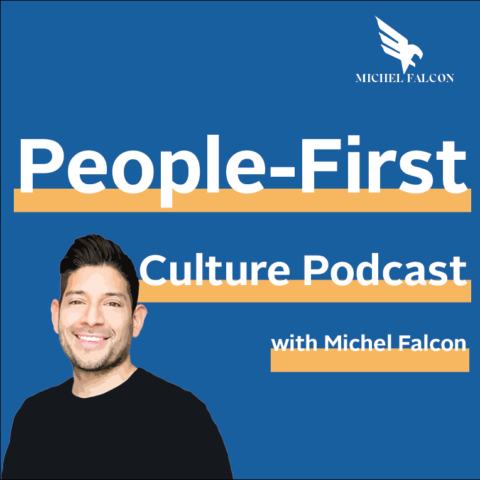To listen to this episode on an Apple device, click here.
To listen on Spotify, click here.
To listen to this episode on another platform, click here.
Hey, everyone. Welcome to the People-First Culture Podcast. I’m Michel Falcon. This is Episode Number 11, an episode I have been waiting to record until after I hired about a couple dozen people in my new business, Brasa Peruvian Kitchen. If you are not subscribed to my email list, go over to michelfalcon.com or click the link below and share your email address if you want to receive these podcast episodes and other education delivered right into your inbox. If you are based in Toronto, or anywhere, actually, I’m going to be hosting a workshop at the beginning of November, sharing all of the new hiring recruiting, interviewing, and onboarding strategy that I’ve implemented in my new business. They are working extremely well, and I’m looking forward to sharing what I’m learning. So I’ll be hosting a webinar in the beginning of November, so sign up to my email list, so you can know when that is.
And this episode is solely focused on one interview question. I’ve never asked it before, up until a couple weeks ago, and it’s working for me extremely well, and I’m going to share how and why that’s working. If you are looking for somebody to help your organization improve the way that they are finding candidates, hosting interviews, asking questions, and then onboarding, send me an email directly. I will link up my email below, also. Now, let me address something. In North America, and I don’t know about other continents, but for now, let’s focus on North America. There is a “labour shortage.” And I’ve heard of this throughout the pandemic, and I questioned whether there was or not. And I understand. There are people that will suggest that some individuals are not working right now because of government subsidies, because of the pandemic, and many other reasons.
I don’t believe that’s the case. You wouldn’t want to hire individuals that’d rather just sit at home and not work. So don’t worry about that pool of candidates in the first place. There are absolutely perfectly able people and high performers available for hire. You just need to build something worth coming to see, and that’s what the webinar is going to be about. But today, the question that I’m going to share with you has helped me during this “labor shortage.” I’ve had zero pain in finding great people and hiring them. The question goes like this: “What are your most unbecoming qualities that I’m going to learn about you within one to three months? I’ll answer first.”
This is generally a question that I’ll ask toward the end of the interview. Now, I’ve been asking this question in virtual group interviews. So picture me on a Zoom call, with four other people with their cameras turned on, allowing ourselves the permission to be vulnerable and talk about some of our bad habits and traits. So I’ll answer that for you right now. It’s something that I really dislike about myself, and I’m trying really hard to get it out of my system. And I’m seeing some progress, but I’m still not perfect. But one thing that really makes me irritable is having to repeat myself to people on my team.
So for example, let’s say Joey is on our marketing team, and we happen to go for a coffee, and during our conversation and our walk and talk, while we’re enjoying our coffee, I think of an idea for our social media. And I say, “Hey, Joey, can you get this complete, designed, and ready to post by September 28th, let’s say?” And Joey says, “Yes, I’ll do it.” Now, September 28th and 29th comes along, and I remember: “Wait, did Joey post that, like he said he would?” And I go to check to see if he has, and he hasn’t. And then I follow up with Joey, and the answer I get is, “I forgot.” That makes me irritable, and now the outcome or the unbecoming quality is I can speak condescending to people, at times, when I’m irritable. I don’t like it about myself, and I’m working really hard at ridding myself of this trait.
This is what I share with candidates during the interview process. Now, I’m showing them all my warts. I’m leaving it all out on the table, so that they can make a decision on whether they want to work with somebody that has this unbecoming quality, even if they’re working on it. I don’t want to go one, two, three, or six months into the relationship with team members and have them not aware of these things.
Now, if you think of your personal life, the strongest ones are the relationships that you have, where you can be honest with people and tell them who you are and not hide your bad traits. Just put it out on the table. Now, when I started asking this question, I was curious to know if people were going to be honest or not and have genuine questions. I’ve had people say, “I’m disorganized.” I thought that was very honest, and while I don’t enjoy working with people who are disorganized, I didn’t write that individual off. I asked, “Have you ever been coached on how to be organized?” And he said, “No.” And of course, I don’t know of a formal organizational course you could take. Maybe there are some out there, but I’m not familiar with them. I would consider myself an organized person, and I know others who are very organized, also. And I know my method to it, and perhaps I’ll host a podcast on how I’ve organized myself. But I liked how that candidate was honest.
Now, if somebody gives you a runaround answer that actually isn’t an unbecoming quality, I will ask them again. And I’ll say, “I don’t believe that was a straightforward answer. I don’t see that being an unbecoming quality; try again.” And if they do try again and they still don’t give you an answer, that seems honest. One of two things are happening. One, they are not honest. Or two, and equally as bad, is they’re not self-aware of their unbecoming qualities. I’m not a trained psychologist; I’m not building a therapy practice. I’m building a fast-casual restaurant company. Perhaps you’re building a real estate company or whatever organization or industry that you’re in. You need people who are self-aware, so that they know where their strengths and their weaknesses are. If they’re not self-aware, good luck. You’re going to have to act like their therapist, and your company does not have time for that. That is not why you set out to grow your organization. Maybe there’s a place for an individual like this, but I don’t see them having a seat at the table in my organization.
So that’s the question that I have: “What are your most unbecoming qualities that I’m going to learn about you within one to three months?” And it’s imperative that the leader answers first, so that people that are being interviewed, the candidates, feel comfortable. They feel safe in an environment where they can be honest, where they can be vulnerable.
When I started asking this question, I was taken back by how honest people were, especially because they may say things that may really turn them off from the person that’s doing the interviewing, like the individual that I told you about who said they were disorganized. That was very risky, if you will, because the company or the interviewer may have said, “Okay, thank you for telling me that. I’m not interested.” But it really comes down to what type of company you’re trying to build. If you see the good in somebody, you see the potential … They have the potential to be a high performer, but they got this one trait that you think you could bestow some education on. Maybe you consider hiring them, instead of completely writing them off.
Start asking this question. Tweet at me. DM me. Email me. Let me know how it’s working, but if you’re going to be the one that’s asking this question, be very, very clear in what your answer is. I’m not proud of the answer that I have to give, but I’m proud that I can be honest, because me being honest will lead to the honesty that you receive from the candidates that you’re hiring.
I’m here to say that there is no labor shortage. We just got to be better at finding people, recruiting them, better at interviewing. We’re good at marketing, right? We’re good at customer service. We got to focus on the people side of things more intimately. Go out and try to answer that question, and like I said, I’m hosting a webinar on all this topic. I’ve got some killer strategies that are working for me right now, and it’s allowing me to bypass this labor shortage that people keep talking about.
So if you’re interested in learning more of these strategies, head over to michelfalcon.com. Sign up to my email list. You’ll see a bunch of areas on the website to be able to share your email address, so that you get on the list. And if not, direct message me. Get in contact. Send a carrier pigeon. However which way you want to get in contact with me.
Thank you so much for listening to Episode 11. Subscribe to my podcast, because you will be alerted on when I release the next episode. Episode 12 is going to be fantastic. I can’t wait to record it. And leave a review, if you like this podcast. If I’ve ever shared anything with you that you have valued from, please consider leaving your review. It’ll only take you about 30 seconds. All right, until next time.

